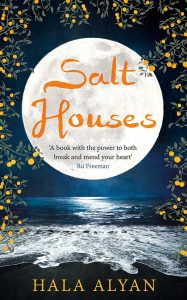By Hala Alyan
Hutchinson Penguin Books, UK, 2017, 312 pages, $25
Reviewed by Mahmoud Muna − Educational Bookshop, Jerusalem.
In this majestic book, Alyan tells the story of a Palestinian family. Spanning several decades and generations, the package contains weddings, traditions, and moments of small happiness − but also war and displacement. However, this book is a departure from the usual historical novels on Palestine. The focus is not on a poor refugee family that loses its home and struggles to survive in tents and shacks. Rather, it is the story of a well-off family. It follows the lives of individual family members who live in houses (yet not homes) in several places that range from Jaffa and Amman to Boston and Paris.
This novel unveils the emotional consequences of the displaced; it traces the weight of history down through the generations, following the lives of those who once lived in a place they called home, and their descendants. Beautiful images of community are displayed through family gatherings and mundane daily routines that emphasize the role of traditions in family relationships. For displaced Palestinians, such gatherings frequently serve as reminders of a beautiful past or cause flashbacks of life at “home.”
This book elegantly captures how the trauma of uprooting is experienced continuously, or perhaps how it is inherited. By focusing on this deep inner layer of pain, the author brilliantly exposes the never-ending, incurable trauma that has been marking the lives of generations of displaced Palestinians, regardless of their social and financial status. Suddenly, we see and understand the uniting factor between collective loss and feelings of personal discomfort and strangeness.
Alyan shatters a number of social, cultural, and religious stereotypes by not overly dramatizing events and being truthful and honest to the story of the people themselves. She is doing her characters a huge service by allowing them to be their own agent, tell their own story, and express their emotions and feelings in all their happiness and misery. Reading this novel in its charming style of writing is a reminder of how much value poets can add when writing prose.
This is a beautifully crafted novel in which each chapter takes a turn to present a family member who lives in a different city. Historical events and political climates surround the epic of the Yacoubs, gently providing historical context for new readers of the Palestinian story. The storyline is easy to follow and the characters are well developed; by the end of the book, readers will find themselves captivated by Alyan’s characters because they know them intimately.
Palestinian young writers are finally taking the initiative to write their family stories, a step that understandably comes late, as generations needed time to process and deal with a difficult past that is marked with grief and loss. The impact of such stories on readers is immense and provides the opportunity to gain a comprehensive understanding of the human dimension of this conflict. The timing of publication of these stories is pivotal as well: As geography and stones are dominating the discussions on the world stage, human stories in all their fullness shine to tell the real story.


